Winter Solstice is, in a way, the perfect welcome to the new year. A chilly one. Roland Schimmelpfennig, 49 and one of Germany’s most frequently performed dramatists, wrote Winter Solstice in the course of 2013 and 2014, in response to the rise of the new right in Europe. His play is better than a clarion call. Like its antihero, it is stealthy and subtle. It calls on its audience not to rise up and resist but to train themselves in observation. To realise by watching this gradually unfolding drama how easy it is to be inveigled, infiltrated.
There is nothing rabble-rousing about the stranger who rings the “wealthy, middle-class doorbell” of a liberal household on Christmas Eve. He is the model of courtesy – or, as he would say, “chivalry”. He is gracious to older women. He is cosy with children. He plays Bach on the piano. He is a doctor. And he is, it slowly becomes apparent, a neo-Nazi.
The clues to his allegiance – a mention of a “world order”, an insistence on ancestral legacy, a glorification of mountains and blond hair – are carefully distributed. His speech – David Tushingham has provided a distinguished translation – is measured, rising only occasionally, almost imperceptibly to rhetoric. Nicholas Le Prevost incarnates him perfectly. He emits concern; he is sometimes hesitant and furrowed. He offers up generalities with reverence. He looks into another’s eyes, asking him what he really wants as if he were diagnosing a terminal disease. His sincerity is lethal.
As the first to fall under his spell, Kate Fahy is delicate and devastating. She is a vulnerable, cross, older woman, at odds with all around her. She tries nervously to second-guess the responses of others, flashes into bitterness, succumbs rapidly to the visitor’s caressing certainty. Fahy puts this across with witty swiftness: a twist to her mouth, a shadow moving over her face.
Laura Rogers, Dominic Rowan and Milo Twomey are all strong, playing dextrously with Schimmelpfennig’s central wheeze: that characters speak stage directions as well as lines. This has a comic effect and serious intent: setting thoughts against deeds, showing everyone all too obediently following a master script. In a co-production for Orange Tree and Actors Touring Company, Ramin Gray’s direction is continuously inventive but never fidgety.
In Lizzie Clachan’s rehearsal-room design, the cast show what co-operation is in a world that is ceasing to pull together. It is weirdly riveting to watch them, debating and wrangling, make a Christmas tree out of ice-cream cartons and pencil cases and a satsuma. They create the sounds of people half-heard in a nextdoor room. I wish only that Gray had cut 20 minutes of slack from the last third of the evening (two hours without a break). And resisted the temptation to underline international echoes by closing with an American voice.

Comments (…)
Sign in or create your Guardian account to join the discussion